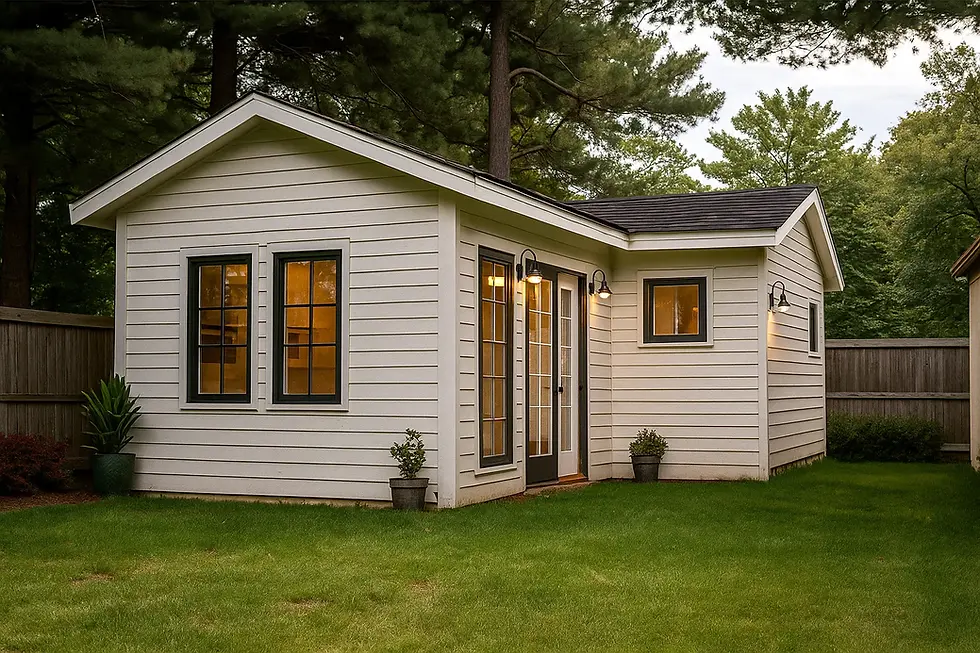Maine ADU Law Update: What LD 1829 Means for Homeowners and Housing Development
- Our Building Experts

- Jul 1, 2025
- 3 min read
Updated: Sep 30, 2025
As part of our ongoing commitment to keep homeowners and communities informed, we're sharing an update on Maine's latest accessory dwelling unit (ADU) legislation—LD 1829. This new law builds on the foundation laid by LD 2003, which first legalized ADUs statewide in 2022 and marked a major step forward in Maine’s zoning reform. LD 1829 continues that progress by streamlining small-scale housing development and creating clearer, more practical pathways for homeowners and builders looking to add ADUs across the state.

What Is LD 1829?
Signed into law in June 2025, LD 1829—"An Act to Build Housing for Maine Families and Attract Workers to Maine Businesses by Amending the Laws Governing Housing Density"—introduces a series of refinements and expansions to state housing policy. It’s designed to reduce regulatory barriers and encourage the development of ADUs and small multifamily housing, especially in areas with public water and sewer.
Key Highlights of LD 1829
Fire Sprinkler Exemptions
ADUs are no longer required to include fire sprinkler systems unless they are part of a building with three or more dwelling units.
Unit Allowances Per Lot
Up to 3 units are allowed on any lot where residential housing is permitted.
Up to 4 units are permitted in designated growth areas or where public water and sewer services are available.
Lot Size and Density Limits
In growth areas with public utilities, municipalities cannot require more than 5,000 square feet per unit.
The first four units in those areas may also be limited to 1,250 square feet per unit for density calculations.
Simplified Project Review
Projects with four units or fewer must go through an administrative review process—avoiding delays from planning board reviews.
Equal Dimensional Standards
Towns cannot impose stricter height, setback, or lot coverage requirements on multi-unit structures than those applied to single-family homes.
Support for ADUs and Nonconforming Lots
ADUs must be allowed on nonconforming lots as long as the new structure doesn't worsen existing issues.
Municipalities may not require owner-occupancy of an ADU property.
Height Bonus for Affordable Housing
Affordable housing developments are permitted to exceed local height restrictions by up to 14 feet, giving designers more flexibility.
Municipal Official Training Requirement
Planning boards and zoning appeals board members must complete land use training within 180 days of appointment.
Prohibition on Local Development Caps
Municipalities may not impose development caps (such as growth ordinances) in state-designated growth areas.
Why LD 1829 Matters to Maine Homeowners & Builders
For homeowners and property owners exploring ADU options, this law opens more doors:
Lower Costs and Fewer Hurdles
Removing the fire sprinkler requirement and streamlining the approval process reduces both financial and administrative burdens.
Greater Flexibility
Allowing more units per lot and relaxing density rules provides more opportunities to build multigenerational housing or generate rental income.
Simplified Design Standards
With consistent rules across building types, homeowners can design smarter, more efficient projects.
From a broader perspective, LD 1829 also supports workforce housing, infill development, and creative solutions for Maine's ongoing housing shortage.
Canbury Homes’ Perspective
At Canbury Homes, we welcome the clarity and flexibility that LD 1829 brings to ADU development. These changes make it easier for our customers to build smart, efficient housing while supporting statewide efforts to improve affordability and supply.
That said, we understand that not every community will experience these changes the same way. Our role is to help homeowners navigate this evolving landscape thoughtfully—balancing housing opportunities with respect for local character and collaboration with municipal partners.
Need Help Navigating These Changes?
Whether you're just starting to explore ideas or ready to build, now is a great time to take advantage of Maine’s updated ADU laws. Our team of building experts are here to help you understand how Maine ADU Law LD 1829 applies to your property and guide you through every step—from planning to completion. Contact us today to start the conversation. Let’s build something great together!
Related Reading: Maine’s ADU Law Explained – LD 2003



Comments